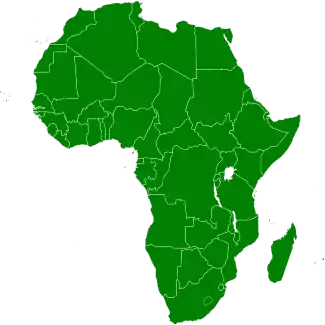Constitutive Act of the African Union
The Constitutive Act of the African Union sets out the codified framework under which the African Union is to conduct itself. It was signed on 11 July 2000 at Lomé, Togo. It entered into force after two thirds of the 53 signatory states ratified the convention. When a state ratifies the Constitutive Act, it formally becomes a member of the AU. All 53 signatory states have ratified the document.
 |
|---|
| This article is part of a series on the politics and government of the African Union |
The only states in Africa that have neither signed nor ratified the document are Morocco and South Sudan. South Sudan has been admitted as a member of the AU but has not yet ratified the Constitutive Act.
Aims
The objectives of the AU laid down in the Act are the following:[1]
- To achieve greater unity, cohesion and solidarity between the African countries and African nations.
- To defend the sovereignty, territorial integrity and independence of its Member States.
- To accelerate the political and social-economic integration of the continent.
- To promote and defend African common positions on issues of interest to the continent and its peoples.
- To encourage international cooperation, taking due account of the Charter of the United Nations and the Universal Declaration of Human Rights.
- To promote peace, security, and stability on the continent.
- To promote democratic principles and institutions, popular participation and good governance.
- To promote and protect human and peoples' rights in accordance with the African Charter on Human and Peoples' Rights and other relevant human rights instruments.
- To establish the necessary conditions which enable the continent to play its rightful role in the global economy and in international negotiations.
- To promote sustainable development at the economic, social and cultural levels as well as the integration of African economies.
- To promote co-operation in all fields of human activity to raise the living standards of African peoples.
- To coordinate and harmonise the policies between the existing and future Regional Economic Communities for the gradual attainment of the objectives of the Union.
- To advance the development of the continent by promoting research in all fields, in particular in science and technology.
- To work with relevant international partners in the eradication of preventable diseases and the promotion of good health on the continent.
See also
Part of a series on the |
|---|
| History of the African Union |
| Wikisource has original text related to this article: |
- Sirte Declaration, 9 September 1999, resolving to create the African Union.
External links
This article is issued from Wikipedia. The text is licensed under Creative Commons - Attribution - Sharealike. Additional terms may apply for the media files.